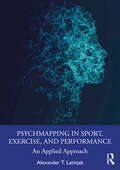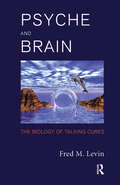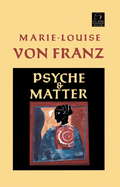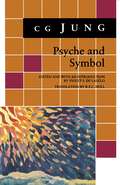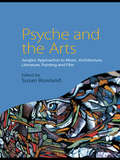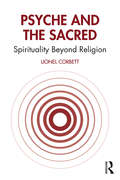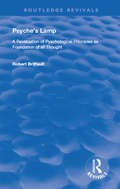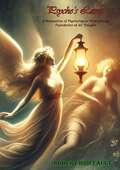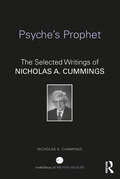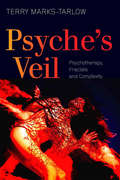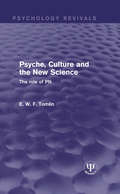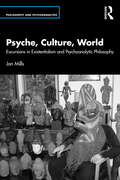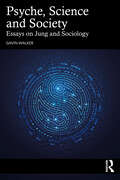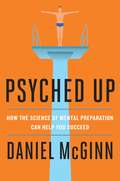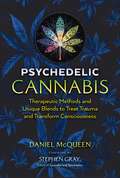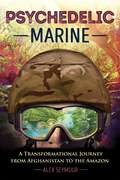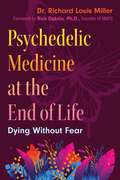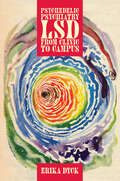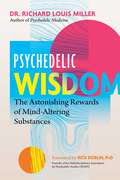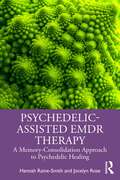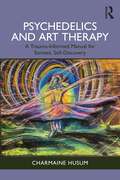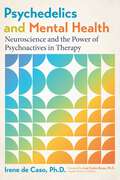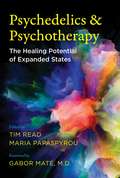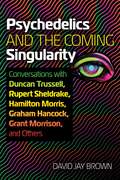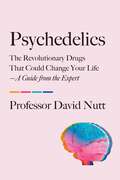- Table View
- List View
PsychMapping in Sport, Exercise, and Performance: An Applied Approach
by Alexander T LatinjakUnderstanding why we act the way we do is key to fostering success. This book introduces PsychMapping, a unique model that visually and philosophically guides readers through the complexities of human behaviour. The holistic approach reveals how different psychological aspects interact and influence each other.The chapters follow the logic of the PsychMapping model, a map of all the key aspects in sport, exercise, and performance psychology. Each chapter is an opportunity for self-reflection and a perfect introduction for anyone interested in exploring the psychological aspects of human behaviour. Packed with practical experiences and real-world case studies, the book applies theories to life, making complex concepts accessible and actionable. A standout feature for professionals is the detailed self-reflection exercise, designed to enhance applied practice.PsychMapping in Sport, Exercise, and Performance is enriching for students, practitioners, and anyone eager to explore the psychological aspects of human behaviour.
Psyche and Brain: The Biology of Talking Cures
by Fred M. LevinThis book contains essential data necessary to develop both a learning theory and a theory of therapeutic change for psychoanalysis. It approaches how the mind-brain deals with the acquisition, transfer, modification, and utilization of information.
Psyche and Matter
by Marie-Louise von FranzTwelve essays by the distinguished analyst Marie-Louise von Franz--five of them appearing in English for the first time--discuss synchronicity, number and time, and contemporary areas of rapprochement between the natural sciences and analytical psychology with regard to the relationship between mind and matter. This last question is among the most crucial today for fields as varied as microphysics, psychosomatic medicine, biology, quantum physics, and depth psychology.
Psyche and Symbol: A Selection from the Writings of C.G. Jung (Bollingen Series (General) #119)
by C. G. JungThe archetypes of human experience which derive from the deepest unconscious mind and reveal themselves in the universal symbols of art and religion as well as in the individual symbolic creations of particular people are, for C. G. Jung, the key to the cure of souls, the cornerstone of his therapeutic work. This volume explains the function and origin of these symbols. Here the reader will find not only a general orientation to Jung's point of view but extensive studies of the symbolic process and its integrating function in human psychology as it is reflected in the characteristic spiritual productions of Europe and Asia. Violet de Laszlo has selected for inclusion in Psyche and Symbol five selections from Aion: "The Ego," "The Shadow," "The Syzygy: Anima and Animus," "The Self," and "Christ, A Symbol of the Self." The book continues with "The Phenomenology of the Spirit in Fairy Tales," "The Psychology of the Child Archetype," and "Transformation Symbolism in the Mass." Also included are the foreword to the Cary Banes translation of the I Ching, two chapters from Synchronicity: An Acausal Connecting Principle, "Psychological Commentary on The Tibetan Book of the Dead," and "Commentary on The Secret of the Golden Flower."
Psyche and the Arts: Jungian Approaches to Music, Architecture, Literature, Painting and Film
by Susan RowlandDoes art connect the individual psyche to history and culture? Psyche and the Arts challenges existing ideas about the relationship between Jung and art, and offers exciting new dimensions to key issues such as the role of image in popular culture, and the division of psyche and matter in art form. Divided into three sections - Getting into Art, Challenging the Critical Space and Interpreting Art in the World - the text shows how Jungian ideas can work with the arts to illuminate both psychological theory and aesthetic response. Psyche and the Arts offers new critical visions of literature, film, music, architecture and painting, as something alive in the experience of creators and audiences challenging previous Jungian criticism. This approach demonstrates Jung’s own belief that art is a healing response to collective cultural norms. This diverse yet focused collection from international contributors invites the reader to seek personal and cultural value in the arts, and will be essential reading for Jungian analysts, trainees and those more generally interested in the arts.
Psyche and the Sacred: Spirituality Beyond Religion
by Lionel CorbettThis book presents an approach to spirituality based on direct personal experience of the sacred. Using the language and insights of depth psychology, Corbett outlines the intimate relationship between spiritual experience and the psychology of the individual, unveiling the seamless continuity between the personal and transpersonal dimensions of the psyche. His discussion runs the gamut of spiritual concerns, from the problem of evil to the riddle of pain and suffering. Drawing upon his psychotherapeutic practice as well as on the experiences of characters from our religious heritage, Corbett explores the various portals through which the sacred presents itself to us: dreams, visions, nature, the body, relationships, psychopathology, and creative work. Referring extensively to Jung’s writings on religion, but also to contemporary psychoanalytic theory, Corbett gives form to the new spirituality that is emerging alongside the world’s great religious traditions. For those seeking alternative forms of spirituality beyond the Judeo-Christian tradition, this volume will be a useful guide on the journey.
Psyche's Lamp: A Revaluation of Pyschological Principles as Foundation of All Thought (Routledge Revivals)
by Robert BriffaultOriginally published in 1921, Psyche's Lamp reminds the reader that all thought and discussion, to whatever aspect of confronting problems, social, political, ethical, vital and personal, they may be directed, posit psychological premises. In the darkness and confusion of a human world under reconstrction, where immemorial landmarks lie strewn and buried under the debris of collapsed super-structures, we shall vainly endeavour to thread our way to any purpose unless we can pierce the obscurity by the light of Psyche's lamp.
Psyche's Lamp;: A Revauation of Psychological Principles as Foundation of All Thought (Routledge Revivals Ser.)
by Robert BriffaultEmbark on a profound journey into the depths of human consciousness with Robert Briffault's Psyche's Lamp: A Revaluation of Psychological Principles as Foundation of All Thought. This insightful and thought-provoking work challenges conventional understandings of psychology, proposing a revolutionary perspective on the role of psychological principles in shaping all human thought and culture.Robert Briffault, a distinguished anthropologist, sociologist, and thinker, presents a compelling argument for the centrality of psychological principles in the development of human knowledge and societal structures. In Psyche's Lamp, Briffault re-evaluates traditional psychological theories, offering a fresh and comprehensive examination of how the mind influences every aspect of human existence.The book delves into the intricate relationships between psychology, philosophy, and the social sciences, highlighting the interconnectedness of these disciplines. Briffault explores topics such as the nature of consciousness, the origins of belief systems, the psychological foundations of morality, and the influence of subconscious processes on human behavior.With his characteristic clarity and intellectual rigor, Briffault examines how psychological principles underpin cultural norms, scientific paradigms, and philosophical doctrines. He argues that a true understanding of human thought requires a deep appreciation of the psychological forces at play, which have shaped our collective and individual experiences throughout history.Join Robert Briffault in this enlightening exploration of the psychological foundations of all thought, and discover how Psyche's Lamp can illuminate your understanding of the mind and its influence on human culture. This work remains a crucial text for those seeking to comprehend the complexities of the human psyche and its role in shaping our reality.
Psyche's Prophet: The Selected Writings of Nicholas A. Cummings (World Library of Mental Health)
by Nicholas CummingsIn this collection of articles spanning 65 years as a clinical psychologist, Nick A. Cummings selects articles that heralded often far in advance each phase of clinical psychology’s evolution to the present. A pioneer in effecting change, Cummings established the first free-standing professional school of clinical psychology, demonstrated that medical utilization was reduced with psychotherapy, was an early proponent of universal healthcare, fought for the inclusion of psychotherapy in National Health Insurance, established Biodyne, the first private managed care firm for mental health coverage, and battled to maintain psychological services for children against the trend toward medication. This resource will teach not just the history of psychology, but what lies ahead.
Psyche's Veil: Psychotherapy, Fractals and Complexity
by Terry Marks-TarlowHistorically, the language and concepts within clinical theory have been steeped in linear assumptions and reductionist thinking. Because the essence of psychotherapy involves change, Psyche’s Veil suggests that clinical practice is inherently a nonlinear affair. In this book Terry Marks-Tarlow provides therapists with new language, models and metaphors to narrow the divide between theory and practice, while bridging the gap between psychology and the sciences. By applying contemporary perspectives of chaos theory, complexity theory and fractal geometry to clinical practice, the author discards traditional conceptions of health based on ideals of regularity, set points and normative statistics in favour of models that emphasize unique moments, variability, and irregularity. Psyche’s Veil further explores philosophical and spiritual implications of contemporary science for psychotherapy. Written at the interface between artistic, scientific and spiritual aspects of therapy, Psyche’s Veil is a case-based book that aspires to a paradigm shift in how practitioners conceptualize critical ingredients for internal healing. Novel treatment of sophisticated psychoanalytical issues and tie-ins to interpersonal neurobiology make this book appeal to both the specialist practitioner, as well as the generalist reader. .
Psyche, Culture and the New Science: The Role of PN (Psychology Revivals)
by E. W. TomlinOriginally published in 1985, this distinguished and constructive critique of modern culture introduced into our language a brand-new term, ‘PN’, standing for ‘psychic nutrition’, which at the time promised to become a household expression. Drawing on his first-hand knowledge of oriental civilizations; on discoveries of Jung, especially his concept of psychic energy; on the ideas of the cultural anthropologists; and not least on the New Science implicit in microphysics and microbiology, E.W.F. Tomlin, whose philosophical books have been translated into several languages, shows how the human psyche requires its own kind of nourishment just as urgently as the body needs food. In the industrial societies of the West, this need has often been ignored. Reformers, in their earnest though sometimes inept endeavours to create a better world, have too often exposed us to the dangers of psychic starvation and the noxious effects of what may be called ‘neg-PN’. Here lie the roots of violence and the lack of direction so conspicuously afflicting modern man and woman. Examples of PN, positive and negative, are given, lending the book an immediacy and practical character often lacking in studies of this kind. In the new scientific approach here adopted, the divisions between matter and life, and life and mind, are discarded, and the old conflict between science and religion shown to belong to an out-of-date world view. The result is a radical reappraisal of the nature and function of religion and art, the two great psychic forces in history. Indeed, the present crisis is shown to originate in the psychic sphere rather than in the political and economic order. Deeply felt and elegantly written, yet not lacking in wit and humour, the book ends with some concrete ideas on how a more balanced culture may be achieved.
Psyche, Culture, World: Excursions in Existentialism and Psychoanalytic Philosophy (Philosophy and Psychoanalysis)
by Jon MillsAcross the array of topics explored in this comprehensive volume, philosopher and psychoanalyst Jon Mills argues for a fundamental return to the question and meaning of existence. Drawing on the traditions of German Idealism, existentialism, and onto-phenomenology, he offers a rich tapestry of insight and critique into the foundations of psyche, human nature, and society. As a philosophy of mind and culture, psychoanalysis offers us a promising perspective to reengage our being in the world in meaningful ways that illuminate human existence, the mysteriousness of unconscious processes, our relation to transcendence, ethical obligations towards social collectives, and the wonder of logos for our present-day consciousness. After examining the unconscious origins of psychic reality and the contradictory nature of our internal lives, Mills examines the scope of existentialism from antiquity to postmodernism, the question of authenticity, paranoiac epistemology, the essence of evil, dysrecognition and social pathology, belief in God, myth, the ideologies of science, hermeneutics, truth, freedom and determinism, and the fate of civilization in relation to the pervasive forces that threaten our existence. Psyche, Culture, World will be of interest to philosophers, psychoanalysts, psychologists, academics, and students in the arts and humanities, cultural studies, anthropology, myth, psychology of religion, and psychotherapy.
Psyche, Science and Society: Essays on Jung and Sociology
by Gavin WalkerIn this new volume, Gavin Walker attempts to open a conversation between sociology and Jungian psychology, both often overlooked by each other, through a series of wide-ranging essays. This book provides a Jungian counterpoint to the more accepted Freudian perspective in sociology by engaging with several key themes, including race, gender, urban sociology, religion and the environment. The chapters here consider methodological issues, such as how Jungian psychology might contribute to our understanding of human nature, and Jung’s – and sociology’s – complex and manylevelled relationship with anthropology. As a whole, this unique work provides an open-ended exploration of what sociology includes and excludes from its agenda, and asks how engagement with Jung might shift the centre of gravity of a heterogeneous discipline. Psyche, Science and Society will be of interest to academics and students working in the fields of analytical psychology and sociology, as well as psychoanalysis, anthropology, feminism, environmentalism, comparative religion and the history of science.
Psyched Up: How the Science of Mental Preparation Can Help You Succeed
by Daniel McginnClosing the sale. Asking for a raise. Nailing the big presentation. Of the 2,000 hours you work every year, your success or failure is determined in the couple of dozen crucial hours when you need to bring your absolute best. Will you?The last few minutes before a major challenge can be terrifying. Ever wished you knew how to make sure you ace the make-or-break test, audition, or interview?We often feel the most powerless just before we’re expected to act powerful. As you’ll learn in this life-changing book, practice might make perfect, but perfection is useless if you can’t summon it when it counts. Pulling off a great speech or the pivotal at bat also requires the right kind of mental preparation.In Psyched Up, journalist Daniel McGinn dives into the latest psychological research and interviews athletes, soldiers, entertainers, and others who, despite years of practice and enviable track records, will ultimately be judged on their ability to delivera solid performance when it’s their turn to shine. For instance, he reveals...• How Jerry Seinfeld’s jacket and Stephen Colbert’s pen help them get laughs.• What General Stanley McChrystal said to Special Forces before they entered the battlefield.• Why the New England Patriots hired the DJ from the Red Sox to help them win.Among other counterintuitive insights, McGinn reveals why trying to calm your backstage jitters can be worse for your performance than channeling it into excitement; how meaningless rituals can do more to prepare you in the final moments than last-minute rehearsal; and how a prescription from your doctor could help you unleash your best skills.Whether you’re a sportsperson or a salesperson, an actor or an entrepreneur, one bad hour can throw away months of hard work. There’s so much conflicting popular advice that we often end up doing the wrong things. McGinn separates the facts from the old wives’ tales and shares new, research driven strategies for activating your talent, optimizing your emotions, and getting psyched up to take the spotlight.
Psychedelic Cannabis: Therapeutic Methods and Unique Blends to Treat Trauma and Transform Consciousness
by Daniel McQueen• Explains how cannabis can be used to treat trauma and emotional pain, as a profound problem-solving tool, and as a potent catalyst for self-transformation and ongoing healing work • Shares methods to minimize the unwanted effects, such as intensified anxiety and paranoia, and direct the experience to produce deep physical relaxation and, when needed, elevated healing states • Details how to blend cannabis strains for specific kinds of psychedelic experiences and how to prepare for your sessions to ensure success Despite the recent resurgence of interest in the therapeutic potential of psychedelics, Cannabis sativa as a psychedelic therapy has been completely overlooked. Yet, as psychedelic specialist Daniel McQueen reveals, when used skillfully and with intention, cannabis can be used to treat trauma and other mental health concerns just as psilocybin mushrooms and MDMA can. It can also be used as a problem-solving tool and as a potent catalyst for self-actualization and ongoing healing work. Presenting a step-by-step guide, McQueen explores how to transform cannabis into a reliable and safe psychedelic medicine. Drawing on his years of experience working with clients to release traumas and emotional pain and step into their full potential, he explains the importance of proper dose, set, setting, and intention and details how to prepare for your psychedelic cannabis sessions to ensure success. He shares methods to use cannabis in a specialized and mindful way to minimize unwanted effects, such as intensified anxiety and paranoia, and direct the experience to produce vivid psychedelic states, deep physical relaxation, and healing. Looking at the unique qualities of di erent cannabis strains, the author explores the art of making a psychedelic cannabis blend, the possibilities and hidden potentials of each strain, and how to blend strains for specific medicine experiences, ranging in similarity to MDMA, psilocybin, and even ayahuasca. Unveiling new depth to this ancient spiritual and medicinal ally, McQueen shows how consciously using cannabis as a psychedelic can help transform your trauma into resilience and shift your mindset from surviving to thriving.
Psychedelic Marine: A Transformational Journey from Afghanistan to the Amazon
by Alex SeymourA vivid portrait of both the traumas of war and the shamanic healing ceremonies of ayahuasca• Explains how our culture lacks rites of passage and how shamanic ritual can fill this gap• Reveals how ayahuasca frees your consciousness from inherited beliefs, fears, and traumatic experience, allowing healing from PTSD, alcoholism, and addiction• Details the author’s experiences in Afghanistan, sailing on the Amazon river with a shaman, and the many ayahuasca ceremonies he experienced in the jungleAfter returning from a tour of duty during the war in Afghanistan, Alex Seymour needed a way to cope with the extremes he experienced as a member of the Royal Marine Commandos, losing 7 men in his unit, and having his best friend critically injured by a Taliban bomb. Drawing upon his pre-deployment experiences with DMT and psilocybin mushrooms, Alex knew that entheogens could help him release his fears and traumas. But he also knew that simply taking psychedelics wasn’t enough--he needed ceremony, something sacred to draw meaning from his experiences, to help him reassess not only the war and his role in it, but his entire life. So he set out for the Amazon in search of the hallucinogenic brew known as ayahuasca and a shaman to guide him. The result is a crazy, page-turning adventure where he journeys deep into the jungle and himself.Alex soon finds himself deep within the jungle on an incredible adventure, sailing on the Amazon river with an ayahuasca shaman and his troop of 8 female shamanas, whose ethereal songs help guide participants during the nightly ayahuasca ceremonies. Accompanied by others seeking wisdom and a redemptive experience from their First World professional lives, Alex finds his core beliefs fundamentally challenged, replaced by the power of direct experience of the sacred, which allows him to release his fears from the war and set an inspiring path for the future.Painting a vivid portrait of both the anguish of war and the transcendent world of shamanic ritual, the author shows how young people often enlist in the military to satisfy our human need for a rite of passage into adulthood, a ritual sorely missing in our culture. He explores how ayahuasca can offer a way to help soldiers prepare for war and help combat veterans heal from war and overcome PTSD--as well as alcoholism and addiction. From Afghanistan to the Amazon, the author shows how ayahuasca frees your consciousness from inherited beliefs and fears, offering a truly transformative rite of passage.
Psychedelic Medicine at the End of Life: Dying without Fear
by Dr. Richard Louis Miller• Outlines 10 steps for dying gracefully with the help of psychedelics, including how to navigate the complex legal landscape and find the right guide and therapy• Looks at clinical studies of psychedelics from UCLA, Johns Hopkins, and NYU School of Medicine that show dramatic lessening of end-of-life anxiety in terminally ill patients• Shares wisdom from experts on psychedelic research and palliative care, including Roland Griffiths, Katherine MacLean, Ira Byock, and Anthony BossisExamining the evolving landscape that is found around end-of-life psychedelic care, Dr. Richard Louis Miller, a clinical psychologist for more than half a century, looks at how LSD, MDMA, psilocybin, and ayahuasca can be vital tools in allowing individuals in all stages of life to confront fears of dying and, in so doing, lead richer lives.Miller shares wisdom from experts on the frontiers of psychedelic research and palliative care—including Roland Griffiths, Katherine MacLean, Ira Byock, and Anthony Bossis—and examines cutting-edge studies from Johns Hopkins, UCLA, and NYU School of Medicine that show dramatically decreased anxiety in terminally ill patients through the use of psychedelics. He explores how different substances can help the dying overcome their end-of-life distress. He also provides testimony from researchers and patients participating in psychedelic-assisted psychotherapy that helps convey the experience of ego death at the heart of the psychedelic experience.Miller outlines 10 steps for dying gracefully, without fear, with the help of psychedelics. He examines how to navigate the complex legal landscape and find the right guide, dose, and therapy. He also includes reflections from key figures in the psychedelic community as well as some of his own psychedelically informed mystical and near-death experiences.Revealing psychedelics as a portal of transformation, Miller shows how they are singularly valuable in helping individuals face the end of life with courage and serenity.
Psychedelic Psychiatry: LSD from Clinic to Campus
by Erika DyckLSD's short but colorful history in North America carries with it the distinct cachet of counterculture and government experimentation. The truth about this mind-altering chemical cocktail is far more complex—and less controversial—than generally believed. Psychedelic Psychiatry is the tale of medical researchers working to understand LSD’s therapeutic properties just as escalating anxieties about drug abuse in modern society laid the groundwork for the end of experimentation at the edge of psychopharmacology. Historian Erika Dyck deftly recasts our understanding of LSD to show it as an experimental substance, a medical treatment, and a tool for exploring psychotic perspectives—as well as a recreational drug. She recounts the inside story of the early days of LSD research in small-town, prairie Canada, when Humphry Osmond and Abram Hoffer claimed incredible advances in treating alcoholism, understanding schizophrenia and other psychoses, and achieving empathy with their patients. In relating the drug’s short, strange trip, Dyck explains how concerns about countercultural trends led to the criminalization of LSD and other so-called psychedelic drugs—concordantly opening the way for an explosion in legal prescription pharmaceuticals—and points to the recent re-emergence of sanctioned psychotropic research among psychiatric practitioners. This challenge to the prevailing wisdom behind drug regulation and addiction therapy provides a historical corrective to our perception of LSD’s medical efficacy.
Psychedelic Wisdom: The Astonishing Rewards of Mind-Altering Substances
by Dr. Richard Louis Miller• Reveals how these scientists, doctors, therapists, and teachers have applied their entheogenic experiences in their professions, leading to therapeutic advancements, scientific discoveries, and healing for thousands • Includes contributions from scientific psychonaut Amanda Feilding, psychedelic swami Dr. Allan Ajaya, &“America&’s Doctor&” Dean Edell, convicted psychiatrist Frederike Meckel Fisher, love doctor Charley Wininger, professor of psychedelics Thomas B. Roberts, ethnobotanical explorer Dennis McKenna, the &“Sunshine Makers&” Tim Scully and Michael Randall, as well as many others Over the past decade, many famous entrepreneurs and celebrities have begun to open up about their life-changing experiences with psychedelics that led to their personal successes. But less well-known are the wisdom-bringing psychedelic experiences of many top psychologists, psychiatrists, researchers, and others who have taken what they learned from their entheogenic experiences and applied it in their professions, leading to therapeutic advancements, scientific discoveries, and healing for thousands. In this profound book, Dr. Richard Louis Miller shares stories of psychedelic transformation, insight, and wisdom from his conversations with 19 scientists, doctors, therapists, and teachers, each of whom has been self-experimenting with psychedelic medicines, sub rosa, for decades. We hear from scientific psychonaut Amanda Feilding, founder of the Beckley Foundation; ethnobotanical explorer Dennis McKenna; research advocate and head of MAPS Rick Doblin; and the &“Sunshine Makers&”: Tim Scully, the scientist taught to make LSD by Owsley Stanley, and Michael Randall, the leader of the Brotherhood of Eternal Love. We learn about recasting &“bad trips&” as unfamiliar challenges from psychedelic swami Dr. Allan Ajaya, therapeutic uses of MDMA from &“the love doctor&” Charley Wininger, decades of insights from psychedelic professor Thomas B. Roberts, as well as several others. Revealing the psychedelic wisdom uncovered in spite of decades of the &“War on Drugs,&” Dr. Miller and his contributors show how LSD and other psychedelics offer a pathway to creativity, healing, innovation, and liberation.
Psychedelic-Assisted EMDR Therapy: A Memory-Consolidation Approach to Psychedelic Healing
by Hannah Raine-Smith Jocelyn RosePsychedelic-Assisted EMDR Therapy is a groundbreaking exploration of how eye movement desensitisation and reprocessing (EMDR) therapy can be harnessed to enhance the beneficial effects of psychedelic medications. EMDR is a clinically validated therapy that utilises bilateral stimulation of the brain to access and reconsolidate pathologically encoded memories. The protocolised methods outlined herein offer a practical roadmap for unlocking the full potential of EMDR within the context of psychedelic-assisted psychotherapies, paving the way for scalable psychedelic treatment options.Drawing upon a rich tapestry of research, case material and clinical insight, this book provides readers with a comprehensive understanding of how EMDR’s adaptive information processing (AIP) model conceptualises healing outcomes in psychedelic settings. Emphasising harm reduction, social justice and sustainability, this book systematically outlines a strong focus for the work, to ensure safer, more inclusive, equitable, environmentally conscious practices in psychedelic therapy delivery.Authored by experts in the field, this is a compelling resource that expands the horizon of contemporary psychedelic psychotherapy, offering a novel perspective and a confident new voice in trauma-responsive healing.
Psychedelics and Art Therapy: A Trauma-Informed Manual for Somatic Self-Discovery
by Charmaine HusumThis book serves as a vital resource for clinicians, therapists, and individuals aiming to integrate their psychedelic experiences through the transformative practice of Art Therapy. Rooted in a Trauma‑informed approach, Psychedelics and Art Therapy: A Trauma‑Informed Manual for Somatic Self Discovery offers guidance on navigating the profound psychological and emotional shifts that often accompany such journeys.This book combines creative exercises with meditation and neuroscientific insights to show how Art Therapy can effectively reroute neural pathways, fostering sustained emotional well‑being and personal growth. In an era where the underground market of psychedelic therapy is often unsafe and commercially driven, this book advocates for a sustainable approach to healing that prevents habitual reliance on these substances. Authored by an Art Therapist with over a decade of specialized experience in psychedelic preparation and integration, this book transcends the underground stigmas associated with drug culture, offering a trusted path to healing grounded in therapeutic practices that honor transpersonal and Indigenous wisdom.As the conversation around Psychedelics in therapy evolves, this essential guide provides a structured and compassionate approach to integration and healing, ensuring long‑term personal empowerment and inner well‑being.
Psychedelics and Mental Health: Neuroscience and the Power of Psychoactives in Therapy
by Irene de Caso• Details how psychedelics alter our experience from a neurological perspective, including what neurons they interact with, their effects on cognitive and emotional processing, and why those effects can be therapeutic• Looks at clinical results with LSD, psilocybin from magic mushrooms, and DMT from ayahuasca, as well as empathogens such as MDMA, found in ecstasy• Provides an illustrated introduction to neuroscience and a vision for a new model of psychotherapy where psychedelics help bring lasting healingPresenting a comprehensive guide to the new and evolving landscape of psychedelic-assisted mental health treatment, neuroscientist Irene de Caso takes you on a journey through the brain, revealing how psychedelics and empathogens, if taken in a safe and therapeutic environment, can lead to positive and lasting changes.Providing an illustrated introduction to neuroscience and molecular actions in the body and brain, the author details how psychedelics alter our experience, including their effects on cognitive and emotional processing and how those effects can be therapeutic. She explores the wide body of evidence behind the psychedelic revolution in psychiatry and psychotherapy and looks at clinical studies on hallucinogens such as LSD, psilocybin from magic mushrooms, and DMT from ayahuasca as well as empathogens such as MDMA found in ecstasy. She reviews the efficacy of psychedelics in treating alcoholism and other addictions, post-traumatic stress disorder, social anxiety in autistic individuals, treatment-resistant depression, and other conditions, offering statistical comparisons to conventional antidepressants and mood-enhancing drugs. She also explores the psychedelic experience through neuroimaging and phenomenological experience, considering mystical states, synesthesia, and the therapeutic benefits of momentary ego-dissolution.Laying the foundation for a new model of psychotherapy, de Caso shows how psychedelics can help break down our defense mechanisms, offer direct access to the subconscious, and provide a path to deeper, lasting healing.
Psychedelics and Psychotherapy: The Healing Potential of Expanded States
by Tim Read and Maria Papaspyrou• Examines the therapeutic potential of expanded states, underground psychedelic psychotherapy, harm reduction, new approaches for healing individual and collective trauma, and training considerations • Addresses challenging psychedelic experiences, spiritual emergencies, and the central importance of the therapeutic relationship • Details the use of cannabis as a psychedelic tool, spiritual exploration with LSD, micro-dosing with Iboga, and MDMA-assisted psychotherapy for PTSD Exploring the latest developments in the flourishing field of modern psychedelic psycho-therapy, this book shares practical experiences and insights from both elders and newer research voices in the psychedelic research and clinical communities. The contributors examine new findings on safe and skillful work with psychedelic and expanded states for therapeutic, personal, and spiritual growth. They explain the dual process of opening and healing. They explore new approaches for individual inner work as well as for the healing of ancestral and collective trauma. They examine the power of expanded states for reparative attachment work and offer insights on the integration process through the lens of Holotropic Breathwork. The contributors also examine the use of cannabis as a psychedelic tool, spiritual exploration with LSD, microdosing with Iboga, treating depression with psilocybin, and MDMA-assisted psychotherapy for PTSD. Revealing diverse ways of working with psychedelics in terms of set, setting, and type of substance, the book concludes with discussions of ethics and professional development for those working in the field as well as explores considerations for training the next generation of psychedelic therapists.
Psychedelics and the Coming Singularity: Conversations with Duncan Trussell, Rupert Sheldrake, Hamilton Morris, Graham Hancock, Grant Morrison, and Others
by David Jay Brown• Includes conversations with Duncan Trussell, Graham Hancock, Grant Morrison, Hamilton Morris, Erik Davis, Julia Mossbridge, Rupert Sheldrake, and others• Explores the possibility of human extinction, Simulation Theory, Virtual Reality and lucid dreaming, space migration, DMT research, and advanced robotics• Delves deep into the relationship between psychedelics and ecological awarenessBetween war, inequality, biosphere collapse, climate change, and destabilizing advances in technology like AI, humankind is confronted with an almost insurmountable array of challenges. Yet many brilliant experts are working on outside-the-box solutions, looking to psychedelic-inspired visions of the future to lead humanity through these crises.In a series of conversations with leading minds in consciousness studies, psychedelic culture, anthropology, chemistry, and other disciplines, author David Jay Brown elicits answers to some of the most thought-provoking questions about our origins, our present situation, and the future of humanity and the Earth. Brown and these luminaries explore topics as diverse as potential human extinction, the relationship between psychedelics and ecological consciousness, simulation theory, virtual reality and lucid dreaming, the consciousness-altering effects of the pandemic, space migration and contact with alien intelligence, and DMT research and advanced robotics.Whether he&’s speaking to podcaster Duncan Trussell about the Singularity, comic book author Grant Morrison about magick and the occult, or neuroscientist Julia Mossbridge about psychic phenomena, Brown&’s spirited interview approach helps draw profound insights from these cutting-edge thinkers. What, he asks, are the implications of our understanding of consciousness, particularly altered states—and how might entheogens help raise ecological awareness to impact the future of our species? In this curated colletion of interviews, Brown seeks to find out.
Psychedelics: The Revolutionary Drugs That Could Change Your Life—A Guide from the Expert
by Professor David NuttThe definitive guide to the science of psychedelics—"the perfect intro for anyone curious about psychedelics and MDMA&” (Ethan Nadelmann, founder and former executive director, Drug Policy Alliance)--and how they can impact our health by world-renowned, leading authority Professor David Nutt. We are on the cusp of a major revolution in psychiatric medicine and neuroscience. After fifty years of prohibition, criminalization and fear, science is finally showing us that psychedelics are not dangerous or harmful. Instead, when used according to tested, safe and ethical guidelines, they are our most powerful newest treatment of mental health conditions, from depression, PTSD, and OCD to disordered eating and even addiction and chronic pain. Professor David Nutt, one of the world's leading Neuropsychopharmacologists, has spent 15 years researching this field and it is his most significant body of work to date. In 2018, he co-founded the first academic psychedelic research center - underpinned by his mission to provide evidence-based information for people everywhere. It revived interest in the understanding and use of this drug in its many forms, including MDMA, ayahuasca, magic mushrooms, LSD and ketamine. The results of this have been nothing short of ground-breaking for the future categorization of drugs, but also for what we now know about brain mechanisms and our consciousness. At a time where there is an enormous amount of noise around the benefits of psychedelics, this book contains the knowledge you need to know about a drug that is about to go mainstream, free from the hot air, direct from the expert. Are you ready to change your mind?
